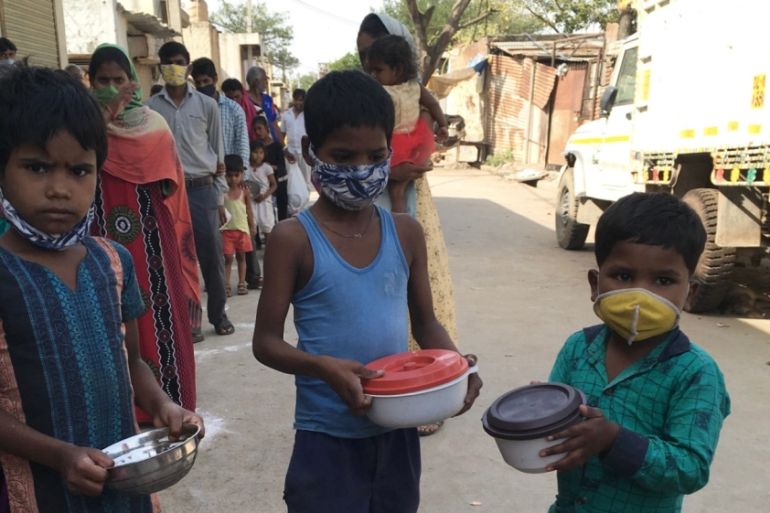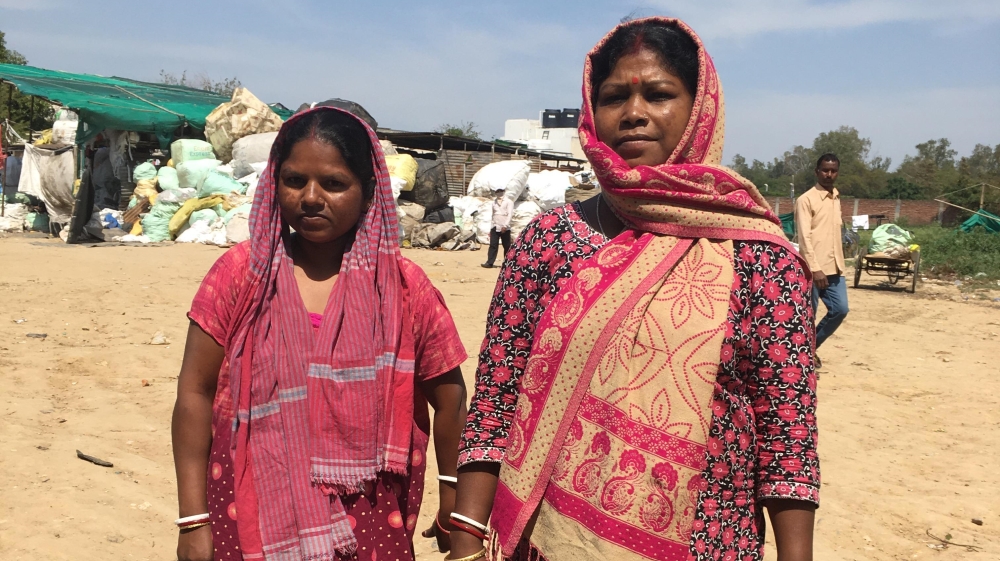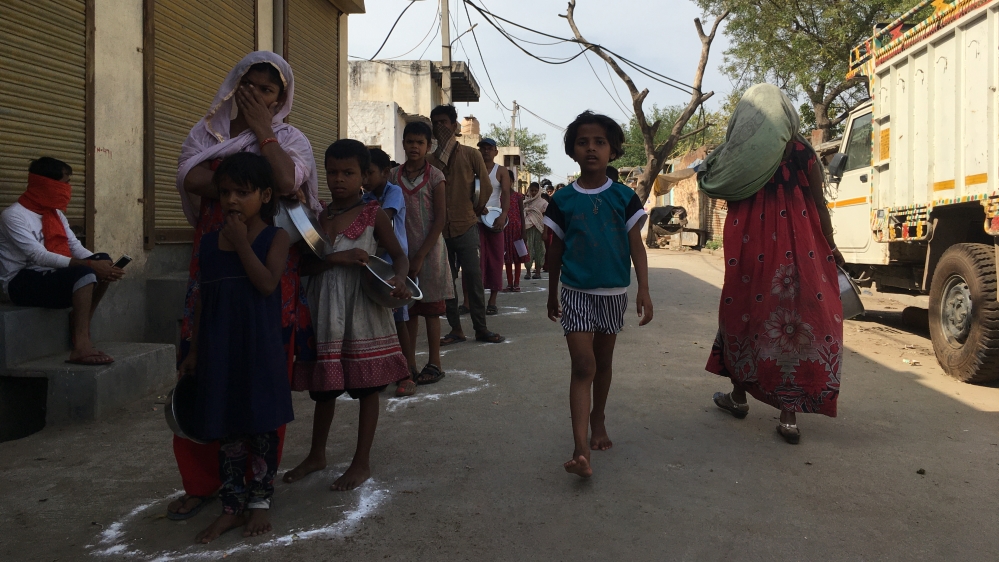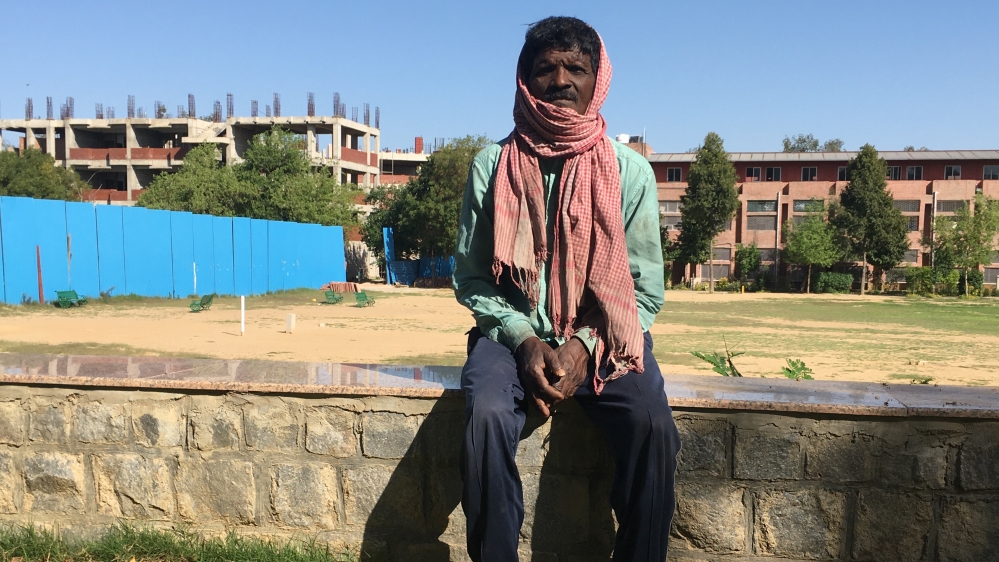India: Hunger and uncertainty under Delhi’s coronavirus lockdown
New Delhi’s food security law covers 40 percent of Indian capitals’ population, leaving out millions of poor people.

New Delhi, India – Two weeks into India’s initial 21 day-lockdown – which has since been extended to six weeks – to prevent the spread of the coronavirus, Sunita Devi, a domestic worker in Nilothi area of Delhi is worried how to feed her four daughters through the rest of the shutdown.
Devi is one of the thousands of casual workers in Delhi who have run out of cash and are now surviving on food distributed by the government at public schools. “We get small portions which I divide among four children. There is barely enough for all of us,” Devi, a single parent, said.
Keep reading
list of 2 itemsLocked down with abusers: India sees surge in domestic violence
Devi is from Fatehpur in northern Uttar Pradesh state about 560km (350 miles) from New Delhi. Her husband, a driver, died of tuberculosis two years ago. Before the lockdown, she earned Rs 5,500 monthly ($73) cleaning and cooking for three middle-class families in Paschim Vihar.
Paying Rs 2000 ($26) in rent, she and the girls survived on less than $2 a day for food and school expenses. Devi had barely any savings, and the lockdown had come as a blow. Her employers, who run businesses, had asked her to stop coming to work during this period without providing any pay to tide her over these six weeks.
“I worked inside their houses, and now they have closed their doors on me. They claim I may infect them. I have a few rupees left. Do I use it to pay rent or do I buy milk, vegetables for my children?” Devi told Al Jazeera.
She stood outside a school building in Nilothi at 4pm local time, an hour before long queues started forming – a common sight these days in big cities across India – for a meal of rice and legumes that evening.
In Kapasheda, 14 miles from Nilothi, Seema Sardar and Kanika Vishvas, both domestic workers, said their employers had turned them away without any pay to live on during the lockdown.
Sardar’s employers, who live in an upscale urban “farmhouse”, had left for the United States in early March without paying her for April. Vishvas, whose husband works as a waste-picker, said she swept and cooked for three men who shared an apartment in Surya Vihar a mile from the slum she lived in.

They had not paid her for March or April. She cannot try to to walk to speak to them, because policemen had blocked the highway.
Nearly half of India’s workforce of 467 million is self-employed, 36 percent are casual wage workers, while only 17 percent are regular wage workers. Two-thirds of them work without contracts and more than 90 percent lack any social security or health benefits in the workplace. The coronavirus lockdown has made survival difficult for them.
On March 24, Prime Minister Narendra Modi announced one of strictest lockdowns in the world, shutting down public transport, but he did not say how the state would support the poor through it.
Tens of thousands of migrant workers fled the city, many of them walking hundreds of kilometres, to reach their homes as factories and businesses were shut as part of government’s measures to fight the virus, which has killed more than 150,000 people worldwide.
The government later announced relief measures, providing each individual with 5 kilogrammes (11 pounds) of rice/wheat for the next three months, in addition to one kilogramme (2.2 pounds) of pulses per family.
In New Delhi, the state government announced it would also provide grains to 7.2 million people, or 40 percent of its population of some 20 million.
But academics and activists say that is not enough as millions of vulnerable families who are not on the Public Distribution System – a food ration scheme – registries will be left out.

The city-state government said it has distributed meals at 1,635 centres, including public schools and shelters for the homeless, to feed 1.2 million residents. But experts pointed out the number of those who need support is much higher during the ongoing crisis.
Dipa Sinha, a development economist at Ambedkar University, pointed out that the central government provision applies to the existing beneficiaries of the PDS under the National Food Security Act, 2013.
“Delhi’s ration registry, like in most other states, is based on the 2011 census. The population has grown since then, it already leaves a large number of urban poor and migrants out,” said Sinha.
Over 3 million workers survive on temporary and daily wage work in India’s capital. For many, the ration cards, if they have any, remain in villages with their families.
|
|
“Nearly 70 percent of Delhi’s population, 13 million, live in slums. Only 7.2 million are registered as beneficiaries under the food security law, but an additional 6.5 million may need food support now as they lack social security and social networks in the city,” said Amrita Johri, an activist with the Right to Food Campaign, a public campaign for policies against endemic undernutrition.
In slums adjoining rich and upper-middle-class areas of Delhi, people, particularly women and the elderly, said they are battling hunger and uncertainties as they cannot find work.
At a construction site at Anand Niketan in Chanakyapuri, where several government offices and international embassies are located, Rajkumar Oraon a worker from a central Indian Indigenous community, said 30 migrants, including women and children, had been stranded without food for three days following the lockdown.
Pockets of deep distress
“We mixed rice with water and lived on it for three days. On March 28, after a local teacher found out, he organised a meal of rice and chickpeas for us, but the food van does not visit every day,” said Oraon.
None of the families at the site have ration cards, which would give them access to food grain entitlements in Delhi.
Munni Chauhan, a widow in her 60s, who worked as a thread cutter for a daily wage in garment export firms, walked over a kilometre (about one mile) to the southwest Delhi district commissioner’s office, defying the lockdown.
She says she has run out of food and money. “I said to myself, if the police wish to thrash me today, let them. I came here to ask the government, what should I eat? How should I pay rent?” said an angry Chauhan.
She added that though she had enrolled in the Aadhaar, India’s biometric ID database which is mandatory to receive any social security benefits, she was not able to get a ration card to access subsidised grains.
Experts on social security schemes said there was no shortage of food stocks and the government must unlock the state food stores to give grains to the poor.

“The grain stocks of the [state-run] Food Corporation of India are now at over 77 million tonnes – three times more than the buffer stocks requirements, and adequate to meet the immediate food needs of millions of poor right now,” explained Reetika Khera, an economist at the Indian Institute of Management, Ahmedabad.
“The union government must commit to make these stocks available – free of cost – to state governments, set up a dense network of community kitchens, and provide grains to those without ration cards.”
Jasmine Shah from the non-profit Delhi Dialogue and Development Commission said those without ration cards – issued by local authorities – would have to register for an “electronic coupon”.
“Over 1.5 million have registered for an e-coupon in the past week, and 0.3 million have received rations under the new system,” said Shah who works with the city-state’s governing Aam Aadmi Party.
But many workers Al Jazeera spoke to struggled to apply for the “electronic-coupon” as it requires a smartphone, which most do not have.
|
|
In Nilothi, Saira Khatun, a construction worker in her forties, said she could not apply as she did not know how to use a smartphone.
Jameesa Khatun, a domestic worker, who earned Rs 2000 ($27) a month cleaning houses before the lockdown, said agents who provide digital services ask for Rs 250-300($4) to help workers do this. “How will we afford this when we can barely afford milk for infants at a time like this?” she asked.
Mohammed Gulzar, a car mechanic, said he had a smartphone but was still not able to apply. He pointed to his mobile screen, which showed the website had crashed because of excessive traffic last week.
Shah of AAP told Al Jazeera the glitch had been resolved this week.
Johri, the food rights activist, called for a simpler system to register the needy in times of crisis like this.
“Economists, including Nobel laureates Esther Duflo and Abhijit Bannerjee, are advising urgent measures at this time, and states should avoid trying being ‘clever’, setting up complex systems of targeting,” said Johri.